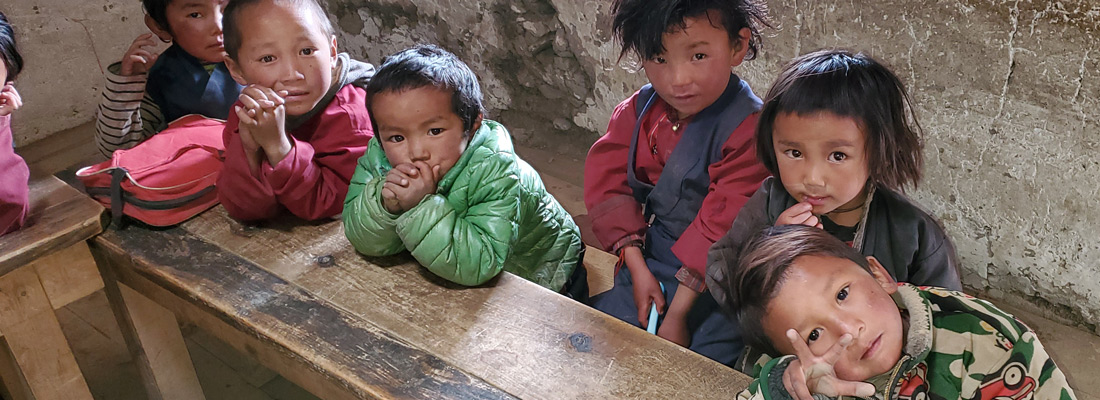
Our 2020 Projects
Thank YOU for a successful fundraising campaign!
We want to thank all of our fabulous supporters for a successful fundraising campaign!
But first, a few words related to Covid 19. We hope you are all healthy and safe, and are adhering to public health guidelines. And that you are able to stay close with family and friends in whatever virtual ways work best for you.
Our dear friends in Nepal; school coordinators, teachers, nurses and some villagers are all now in lockdown, most of them in Kathmandu. No travel between communities is allowed. All supplies and materials for the 2020 school year have been purchased and packed, and are in storage awaiting transport to the Dolpo. If, worst case scenario, the school session is cancelled, the supplies will be used in 2021. In the interim we may need to to provide some level of support to our staff to ensure they can pay expenses and be ready to continue with their work when the time comes.
And while this is a difficult time for all of us, we remain hopeful that the world will return to some type of normal (maybe a new normal) by the fall and that you may be able to help us again with fundraising for 2021.
Read our Request for Support for the 2020 School Year newsletter.
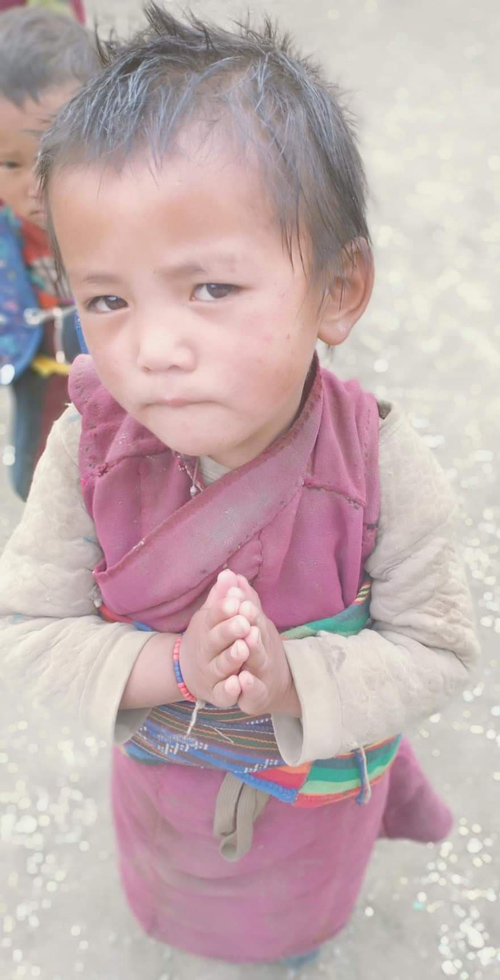
Our 2020 Projects in Brief
The Schools
Supporting education here is our primary focus.
Our primary fund raising period each year is from October through mid February. We send all funds for the entire school year to Nepal in mid February so school coordinators have time to purchase, package and arrange transport of all school and food supplies to reach the Dolpo by April 1. The school year is from April 1 until October 31.
Karang School
$25,000 for the school at Karang. This school has lost all other funding sources so we are providing a much higher level of support to them this year. We manage the budget for this school. The infrastructure at this school is in good condition and they have a very good greenhouse.
We also hope to provide several of their graduating students with scholarships to continue their education beyond grade 5. Pema Gojor Gurung, the school coordinator for Karang, has been working tirelessly to find funding for their hostel in Kathmandu and to qualify his students for discounted school fees at the Tibetan exile school where Altitude Project currently supports Tenzin Norbu.
Thank you from the 65 students at Karang School!
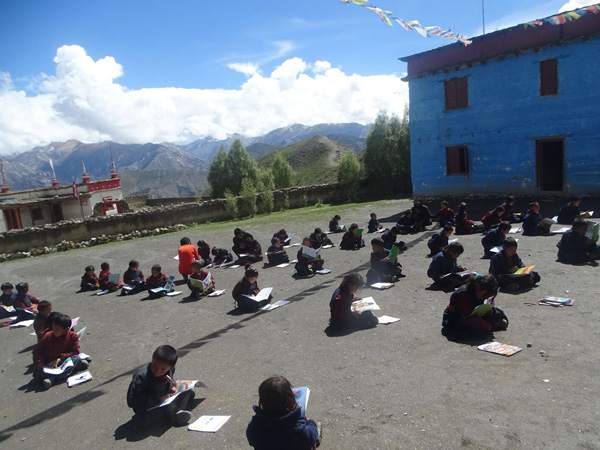
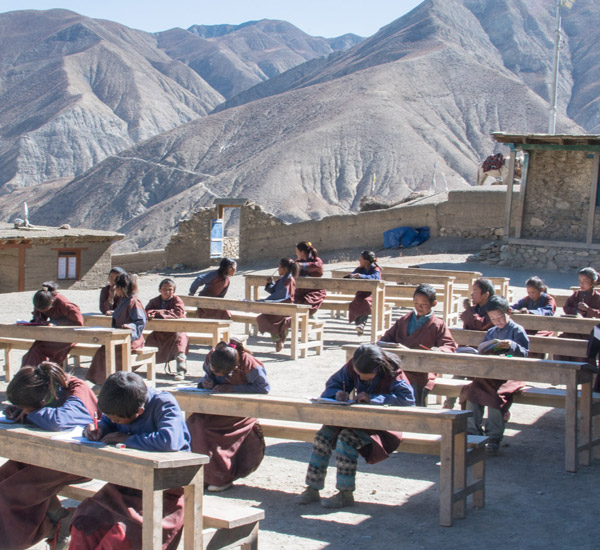
Saldang School
$8,000 for the school at Saldang, the school where Altitude Project started! We work in conjunction with a German non-profit, Freunde Nepal, to support this school. They decide where our support is most needed, for example, in 2019 we were asked to provide teacher salaries for specific staff members. We will also cover some extras not in the regular budget such as toothbrushes, toothpaste, soap and warm socks.
This school is in the process of expanding to accommodate up to class 8. We are not yet sure what that means in terms of the budget from the project side, as communication with the government is not yet complete.
Leaking school roofs are still a problem and part of the budget must be allocated to repairs. There are fewer problems since they started using heavy gauge plastic as part of the roof membrane, but not all areas have been fixed yet.
Thank you from the 85 students at Saldang School!
Komang School
$8,000 for the school at Komang (jointly funded with Sweden’s Tripod of Koma, and one generous German individual!). We manage the budget for this school. Our support is directed towards teacher salaries, student supplies and uniforms, as well as food supplies for school lunches.
Purchased foods are primarily rice and lentils to make dal bhat. Locally supplied foods are yogurt, buckwheat (pancakes), barley (tsampa), potatoes and any other vegetables that can be grown, many in a greenhouse (greens, carrots, cucumber, cauliflower, cabbage and squash).
Thank you from the 35 students at Komang School!
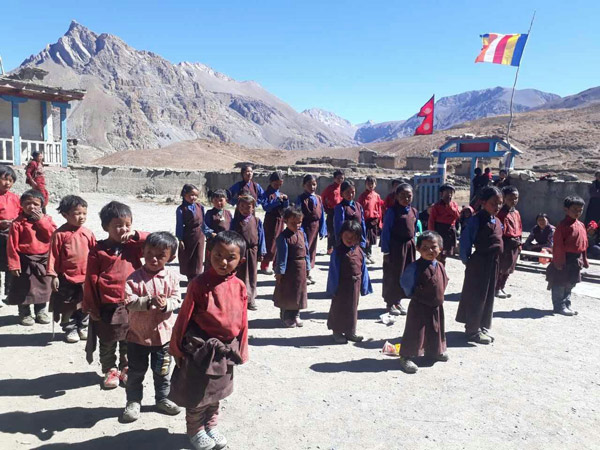
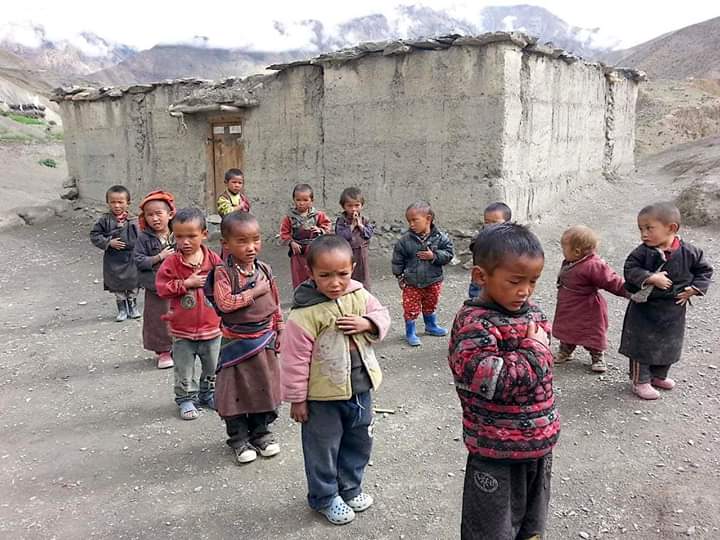
Tiling School
This school lost its sponsor in 2019 so funding was provided by a number of different NGOs. We provided $2,000 for cost to transport all supplies to the school for the year.
This year we are co-sponsoring the school with Peter Werth of Himalaya Currents. Peter is a philanthropist who works building sustainable energy and water projects throughout the Upper Dolpo. We are covering transport costs, wages and materials. There are no desks or floor at this school, the children work on the ground.
Thank you from the 35 students at Tiling School!
photo courtesy of David Powell
Greenhouses
Greenhouses are a new initiative for 2020. Some generous donors have provided dedicated funds that have allowed us to purchase enough materials for up to 20 simple greenhouses that will be attached to homes. The cost of materials and transport is approximately $500 per greenhouse.
Greenhouses are becoming critical for food security as the Dolpo is increasingly impacted by climate change. Seasonal precipitation patterns have become erratic, some years there is not enough snow to provide melt water for the villagers water needs, last year there was too much snow and people and their livestock were killed by avalanches. In recent summers, unusually heavy rains have caused washouts of trails, small bridges and the terraces that are used to grow their staple crops.
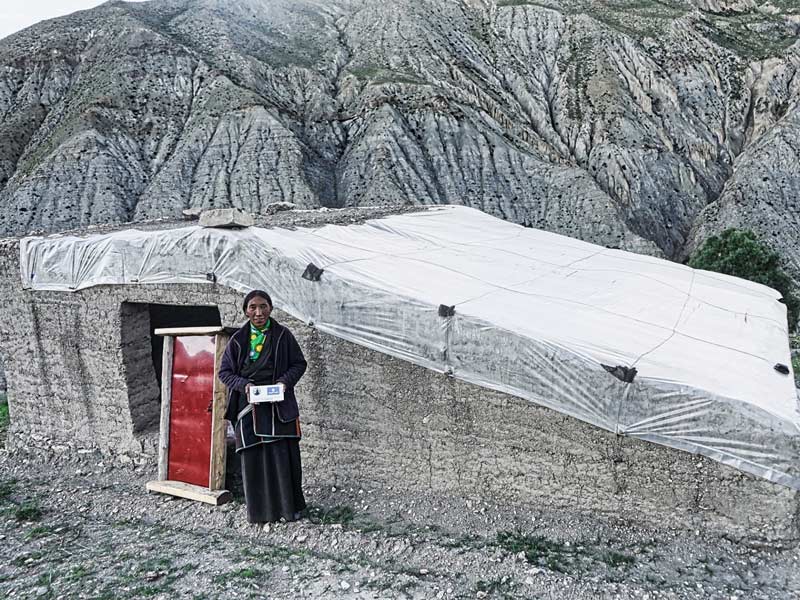
photo courtesy of Peter Hinze (we did not sponsor the building of this greenhouse)
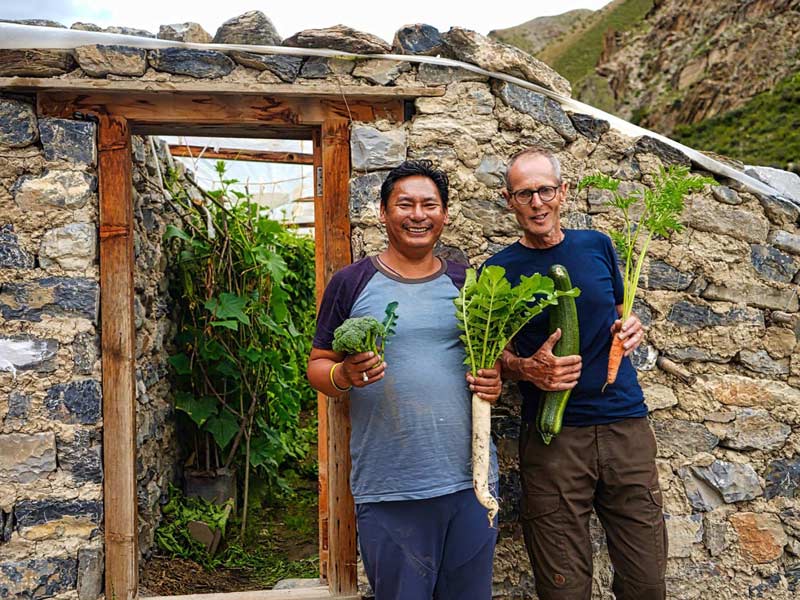
photo courtesy of Peter Hinze
A shortage of arable land and a harsh climate makes food production here challenging. Field crops are basic; barley, buckwheat and potatoes.
Greenhouses lengthen the growing season and provide nutritious vegetables that otherwise cannot be grown. The ability to grow greens, carrots, cucumber, cauliflower, cabbage and squash dramatically improves nutrition and food security.
Greenhouses also provide a warm, bright room in winter. They are used in the home for activities such as weaving, and in schools for winter classes on the Tibetan culture taught by local monks.
Thank you from twenty grateful families!
photo courtesy of David Powell
Solar Lights
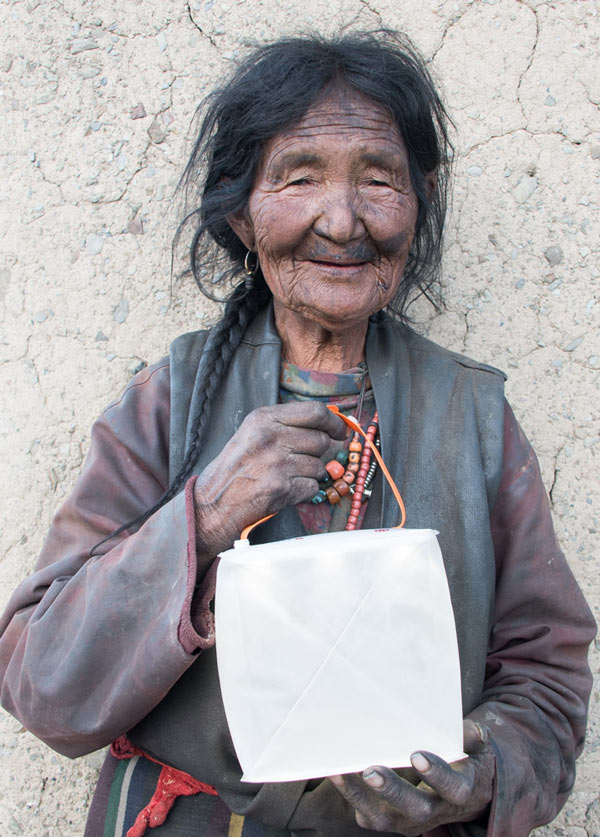
Purchase of solar lights for additional villagers
We are delivering 150 LuminAID portable solar lights to families in some of the smaller villages that get very little support.
In October of 2017 when we trekked to the Upper Dolpo to visit the schools, we took 15 portable solar lights. The cost of each light is ~ $20 US. They provide ~ 150 lumens and can be hung like a lantern – a very practical design. We wanted to test their durability and usefulness so only took a few. Very quickly there was a request for 125 more lights, complete with names of individuals and their village location.
Fire from yak dung or kerosene lanterns is the only light source for most households and the resulting indoor pollution causes pulmonary and eye disease. These lights have proven to be extremely useful and durable; as a general light in the home, to help students read and study in the evenings, to travel to the toilet at night and to visit neighbours. Most unexpectedly, they seem to keep snow leopards away from their animals at night when they are grazing them in their high mountain summer camps.
Many of the older adults suffer from very poor eyesight due to exposure to long hours of sunlight working in the fields at 14,000 feet elevation. They say these lights have really improved their quality of life.
We are able to purchase these at considerable discount for charitable purposes through LuminAID and offer very special thanks for their help!
Thank you from 150 grateful families!
Menstrual Hygiene Kits
We will deliver 200 additional Days for Girls menstrual hygiene kits – the number of kits was determined by nurses from the Dolpo. These kits are only $10 each but are life changing for the girls and women of the Dolpo.
Even though the schools here do not go beyond grade 6, because some students start late, students range in age from 3 to 16. Girls without access to menstrual pads often stay home. If they miss an average of four days of school each month, that is 20 per cent of the school year. Too often this leads to lower grades or dropping out of school altogether.
Each colorful kit contains underwear and 8 reusable menstrual pads, as well as soap, a snap in system and carrying bag. The kits are washable and can last up to five years. Nurses will distribute them and give classes on fertility, biology and hygiene.
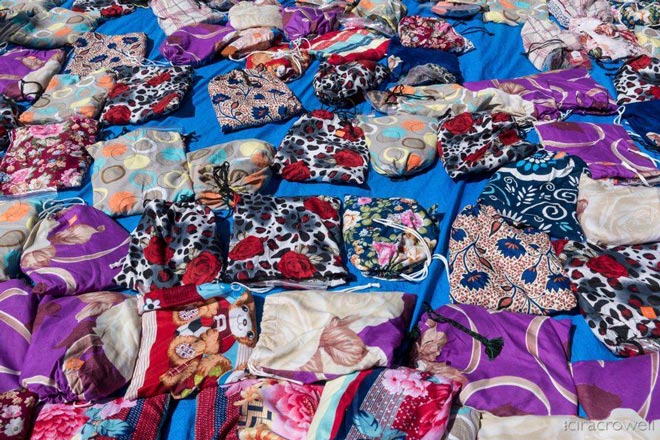
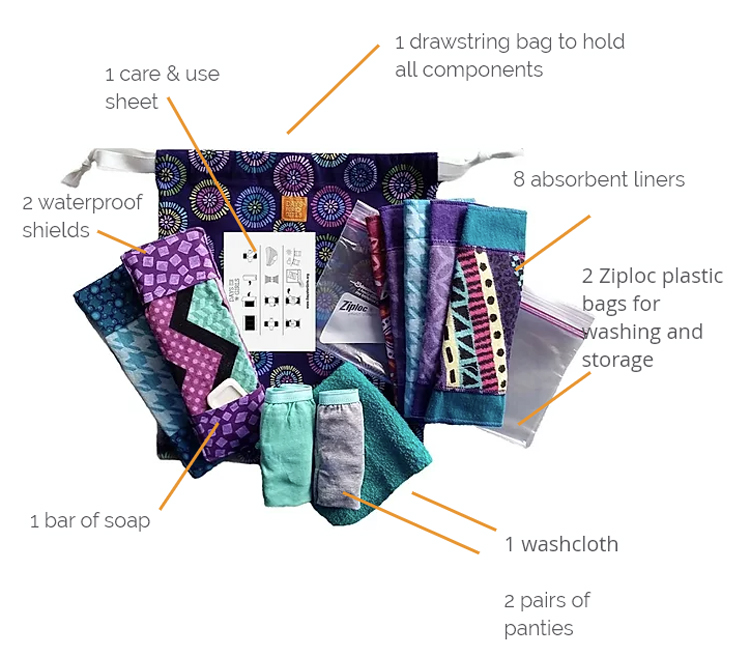
These Kits don’t look like traditional pads… and there’s a reason for that. The bright colors camouflage staining. The absorbent liners unfold to look like a washcloth, which allows women to wash and dry them outside in the sun without causing embarrassment. All of these design choices add up to a lasting, easy-to-care-for solution.
Nurse Tsering Wangmo (below right) is working not only to make women and girls more comfortable but to ‘end the stigmas, taboos, hesitation, shame and negligence.’
photo courtesy of Tsering Wangmo, Nurse and Co-Director of Nomads Clinic
Soap – A Small Helping Hand with a BIG Impact
Hand Washing Promotion
Many of you know that I caught pneumoia on my last trek and had to be helivacced out of the Dolpo to a hospital in Kathmandu.
Pneumonia is a common illness here and many die. Children, especially those weakened by undernourishment are most vulnerable. Improvement of general hygiene, especially hand washing with soap, will dramatically reduce the incidence of this disease. (A study published in the Lancet showed that children younger than 5 years in households that received plain soap and handwashing promotion had a 50% lower incidence of pneumonia than controls. Children younger than 15 had a 53% lower incidence of diarrhea. These are the two leading causes of childhood death.) We are supplying soap for each student as part of the school supplies.

Teacher Training
REED
We will continue with the second year of the three year REED teacher training program.
During 2018, the NGO REED – Rural Education and Environmental Development Centre Nepal, visited schools in the Upper Dolpo to assess the quality of education. Most project teachers are not professionally trained. They are people from the villages who completed high school in Kathmandu and have returned to help their villages as teachers.
REED proposed a three year teacher training program that would provide a path to certification for teachers that are not fully qualified. Nine NGOs contributed to this training effort and feedback from the 2019 training has been excellent.
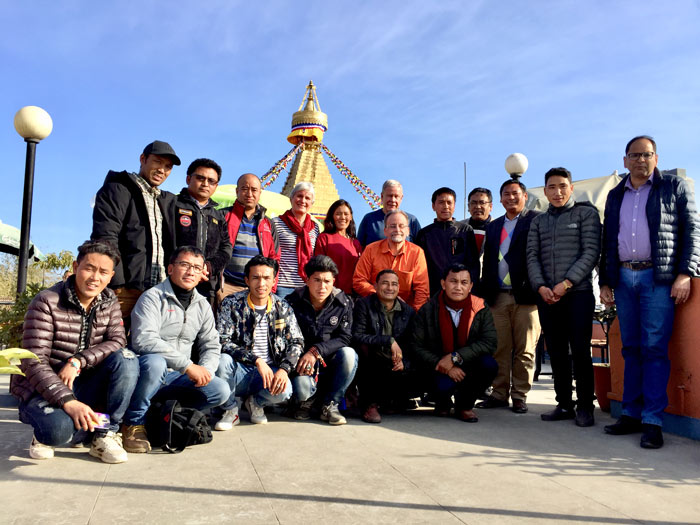
After our teacher training meeting with REED
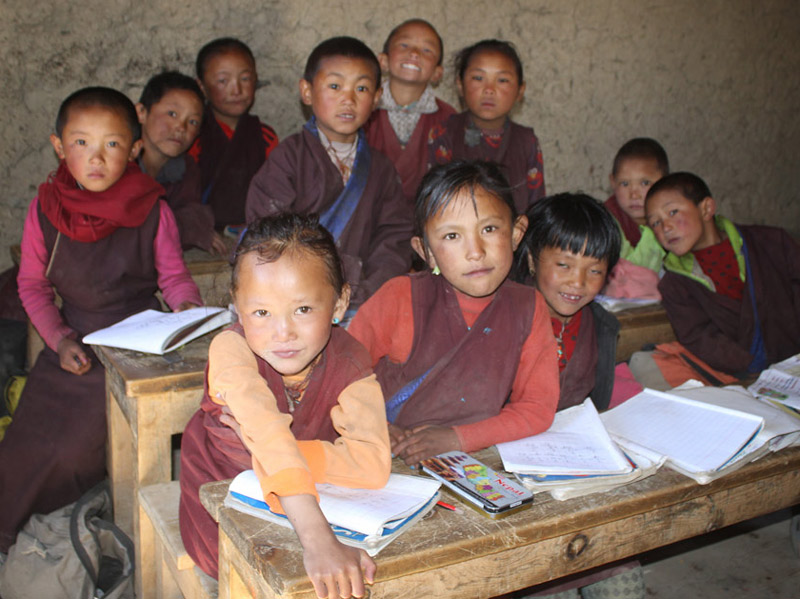
Teacher Training and Poverty
An interesting note…
The 2019 winners of the Nobel prize in Economics sought to explain empirically which interventions work to alleviate poverty and why. “The goal of our work is to make sure that the fight against poverty is based on scientific evidence.”
They illustrated that a true barrier to student achievement was teaching methods that were insufficiently shaped to student need, and that money spent on teacher training helped students learn more in school and yielded long lasting and invaluable results, not just for the individual students, but for lifting the community out of poverty.
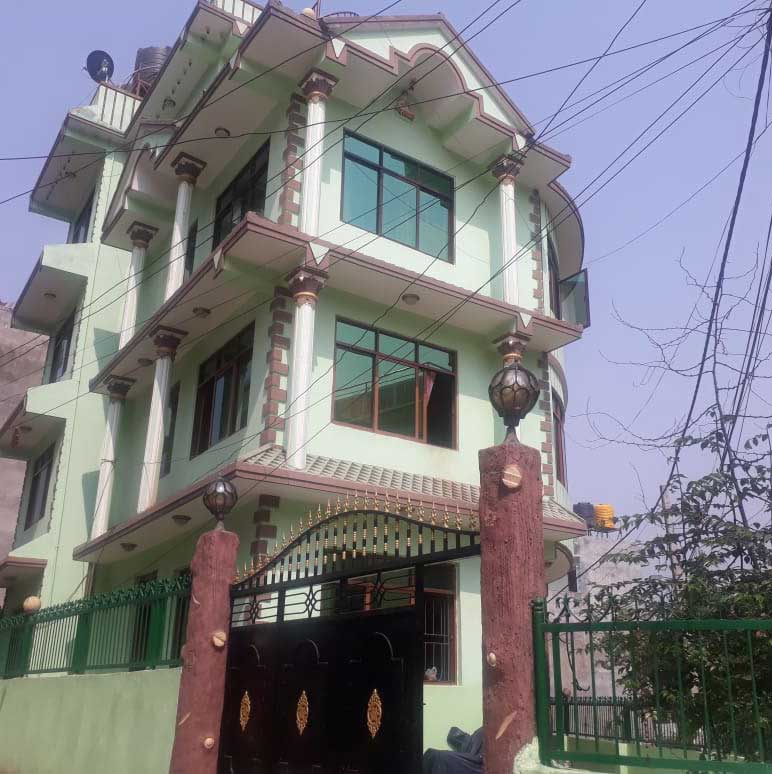
Karang Hostel in Kathmandu
Schools in the Upper Dolpo only teach to grade 5 or 6. Children wanting a secondary education must move to Kathmandu. Each village has a hostel in Kathmandu where the students live and study with other children from their village. They are supported by hostel staff, who are also from their village. This helps to maintain a sense of community and culture – a critical factor when they move from a village of 500 to the completely unfamiliar and chaotic environment of Kathmandu, population 1 million. Please read more, these are truly amazing kids!
The village of Karang recently opened a hostel for its grade 5 graduates. Funding was provided by the government for the first half of the year but the hostel requires support from the international community to continue. The anticipated operating cost is $10,000 US. That includes rent, utilities, food, school fees and supplies and staff wages. Our dream is to find sponsors who want to help with this project on an ongoing basis. If this interests you, please email me. And if you ever travel to Nepal, the hostel would be a very easy place to visit to see the fruits of your kindness.
Many people who trek the Upper Dolpo want to help the wonderful people who live there. And I am delighted that it has happened yet again! A small group of trekkers from BC, Canada spent 20+ days traveling through the region in October. Two sisters were moved to make significant contributions to Altitude Project. One of them has generously offered to support, on an ongoing basis to about 50% of the need, of the hostel. The timing of this support is terrific, as the hostel was without a sponsor and the little money they had was running out quickly. We are all so very thankful for this support – thank you so much – you know who you are!
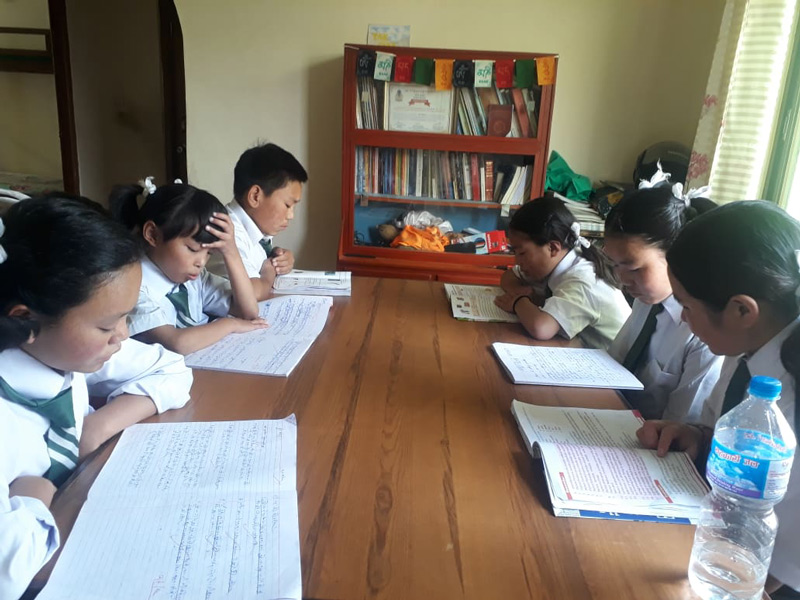
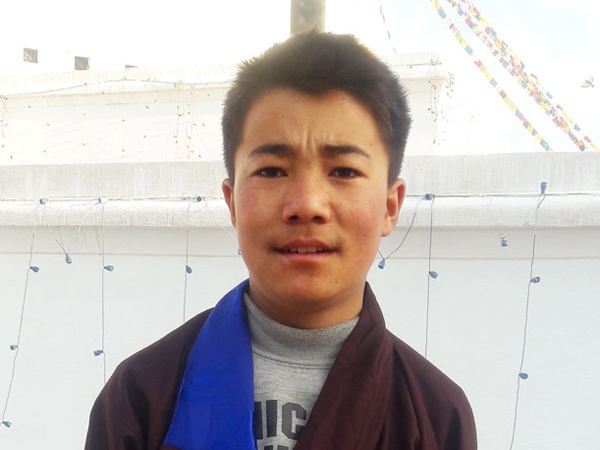
Tenzin Norbu, Saldang Graduate
We will continue to support Tenzin Norbu as he enters class 10, he is living and studying at the Srongtsen Bhrikuti Boarding High School, it is a Tibetan Boarding School of the Tibetan Exile Government.
Tenzin finished class 6 at Saldang in 2016. There were seven class 6 graduates in 2016, which was terrific news, but there was a need to make alternate arrangements for three of the students that could not be accommodated at Shelter108. Altitude Project was asked if we could support Tenzin.
I have visited his school and am extremely impressed. It is very clean and well organized with plenty of room for sporting activities like football and basketball! I have followed, and will continue to follow, Tenzin’s progress during my annual trips to Nepal.
It always seems impossible, until it’s done.
– Nelson Mandela.

